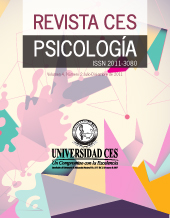El desafío de integrar teoría, investigación y práctica clínica en psicoterapia
DOI:
https://doi.org/10.21615/cesp.13.3.15Resumen
En psicoterapia, así como en otros ejercicios profesionales, hay tres elementos en juego: teoría, práctica e investigación, que se espera que evolucionen y se nutran mutuamente. Sin embargo, en el desarrollo de la psicoterapia actual, diferentes condiciones históricas y profesionales han generado importantes distanciamientos entre los estudios científicos en el área, las teorías y enfoques teóricos que dan base a la formación psicoterapéutica, y los espacios clínicos de los profesionales que ejercen dicha actividad (Von Bergen & Krause, 2016; Watkins, 1997).
Descargas
Referencias bibliográficas
Alicke, M.D. (1985). Global self-evaluation as determined by the desirability and controllability of trait adjectives. Journal of Personality and Social Psychology, 49, 1621-1630. https://doi.org/10.1037/0022- 3514.49.6.1621
Angus, L. E., & Kagan, F. (2013). Assessing client self-narrative change in emotion-focused therapy of depression: an intensive single case analysis. Psychotherapy, 50(4), 525-34. https://doi.org/10.1037/a0033358
Bastine, R., Fiedler, P., & Kommer, D. (1989). Was ist psychotherapeutisch an der Psychotherapie? Versuch einer Bestandsaufnahme und Systematisierung der psychotherapeutischen Prozeßforschung. Zeitschrift für Klinische Psychologie, 18, 3–22.
Bordin, E.S. (1976). The generalization of the psychoanalytic concept of the working alliance. Psychotherapy: Theory, Research and Practice, 16, 252-260.
Braakmann, D. (2014). Historical Paths in Psychotherapy Research. In Gelo O., Pritz A., & Rieken B. (eds) Psychotherapy Research (39–65). Viena: Springer-Verlag Publishing. https://doi.org/10.1007/978-3-7091-1382-0_3
Castonguay, L. (2017). Practice-Oriented Research in Psychotherapy. https://doi.org/10.4324/9781315644271
Castonguay, L. G., & Muran, J. C. (2015). Fostering collaboration between researchers and clinicians through building practice oriented research: An introduction. Psychotherapy Research, 25, 1-5. https://doi.org/10.1080/10503307.2014.966348
Castonguay, L. G., Youn, S. J., Xiao, H., Muran, J. C., & Barber, J. P. (2014). Building clinicians-researchers partnerships: Lessons from diverse natural settings and practice-oriented initiatives. Psychotherapy Research, 25(1), 166–184. https://doi.org/10.1080/10503307.2014.973923
Comer, J., & Kendall, P. (2013). Methodology, Design, and Evaluation in Psychotherapy Research. In M.J. Lambert (ed). Bergin and Garfield's Handbook of Psychotherapy and Behavior Change, (21 – 48). 6th ed. Hoboken, NJ: Wiley.
De la Parra, G., Gómez-Barris, E., Zúñiga, A. K., Dagnino, P., & Valdés, C. (2018). Del “diván” al policlínico: Un modelo de psicoterapia para instituciones. Aprendiendo de la experiencia (empírica) [From the “couch” to the outpatient clinic: A model of psychotherapy for institutions. Learning from (empirical) experience]. Revista Argentina de Clínica Psicológica. 27(2), 182–202.
Elliott, R. (1991). Five Dimensions of Therapy Process. Psychotherapy Research, 1(2), 92-103, http://doi.org/10.1080/10503309112331335521
Elliott, R. (1985). Helpful and nonhelpful events in brief counseling interviews: An empirical taxonomy. Journal of Counseling Psychology, 32(3), 307–322. https://doi.org/10.1037/0022-0167.32.3.307
Fernández-Álvarez, H., & Castonguay, L. G. (2018). Investigación orientada por la práctica: Avances en colaboraciones entre clínicos e investigadores. Introducción. Revista Argentina de Clínica Psicológica, 27, 107-110. https://doi.org/10.24205/03276716.2018.1069
Fernández-Álvarez, J., Prado-Abril, J., Sánchez-Reales, S., Molinari, G., Martín Gómez Penedo, J., … Jeong Youn, S. (2020). La brecha entre la investigación y la práctica clínica: Hacia la integración de la psicoterapia. Papeles Del Psicólogo, 41(2). https://doi.org/10.23923/pap.psicol2020.2932
Frank, J. D. (1984). Persuasion and Healing. The British Journal of Psychiatry, 145, 207-211. https://doi.org/10.1192/S0007125000205084
Gelo, O., Pritz, A., & Rieken, B. (Eds.) (2015). Psychotherapy Research. Foundations, Process, and Outcome. Viena: Springer-Verlag Publishing. https://doi.org/10.1007/978-3-7091-1382-0
Gennaro, A., Al-Radaideh, A., Gelo, O., Manzo, S., Nitti, M., Auletta, A., & Salvatore, S. (2010). Modelling the psychotherapy process as a meaning making dynamics. The Two Stage Semiotic Model (TSSM) and the Discourse Flow Analyzer (DFA). In S. Salvatore, J. Valsiner, J. Travers Simon, & A. Gennaro (Eds.), Yearbook of idiographic science 2009—Volume 2 (pp. 131–170). Roma: Firera Publishing Group.
Hardy, G. E., & Llewelyn, S. (2015). Introduction to psychotherapy process research. In O. C. G. Gelo, A. Pritz, & B. Rieken (Eds.), Psychotherapy research: Foundations, process, and outcome (p. 183–194). Viena: Springer-Verlag Publishing. https://doi.org/10.1007/978-3-7091-1382-0_9
Herrera Salinas, P., Fernández González, O., Krause, M., Vilches Álvarez, O., Valdés, N., & Dagnino, P. (2009). Revisión teórica y metodológica de las dificultades en Psicoterapia: Propuesta de un Modelo Ordenador. Terapia Psicológica, 27, 169-179.
Holmqvist Larsson, M., Falkenström, F., Andersson, G., & Holmqvist, R. (2018) Alliance ruptures and repairs in psychotherapy in primary care, Psychotherapy Research, 28(1), 123-136, https://doi.org/10.1080/10503307.2016.1174345
Horvath, A. O., & Greenberg, L. S. (1986). The development of the Working Alliance Inventory. In L. S. Greenberg, & W. Pinsoff (Eds.), The psychotherapeutic process: A research handbook (pp. 529–556). New York: Guildford Press.
Jaramillo, J. C., Espinosa-Duque, D., Ocampo, D., Arango, A., Arévalo, M., García, L., … Sandoval C. (2018). Caracterización de la atención psicoterapéutica en la IPS CES Sabaneta, Colombia, 2014-2015. CES Psicología, 11(2), 97-110. https://dx.doi.org/10.21615/cesp.11.2.9
Jiménez, J. (1999). ¿Investigación en psicoterapia? Claro que sí. Pero, ¿A quién le interesa?. Revista de Psicología, 8(1), 105-116. https://doi.org/10.5354/0719-0581.1999.17178
Kelly, G. A. (1955). The Psychology of Personal Constructs. New York Norton.
Krause, M. (2011a). Psicoterapia y Cambio. Una mirada desde la subjetividad. Santiago de Chile: Ediciones Universidad Católica.
Krause, M. (2011b). La Psicoterapia: ¿Oficio sin Ciencia y Ciencia sin Oficio?. Revista Colombiana de Psicología, 20(1), 89-98.
Krause, M., & Altimir, C. (2016). Introduction: current developments in psychotherapy process research / Introducción: desarrollos actuales en la investigación del proceso psicoterapéutico, Estudios de Psicología, 37, 2-3, 201-225, https://doi.org/10.1080/02109395.2016.1227574
Krause, M., Altimir, C., Pérez, J.C., & De la Parra, G. (2015). Generic Change Indicators in therapeutic processes with different outcomes. Psychotherapy Research, 25(5), 533-545.
Krause, M., Espinosa, H. D., Tomicic, A., Córdoba, A. C., & Vásquez, D. (2018). Psychotherapy for depression from the point of view of economically disadvantaged individuals in Chile and Colombia. Counselling and Psychotherapy Research 18(2), 178-189. https://doi.org/10.1002/capr.12171
Llewelyn, S., & Hardy, G. (2001). Process research in understanding and applying psychological therapies. The British journal of clinical psychology / the British Psychological Society. 40. 1-21. https://doi.org/10.1348/014466501163436
Matos, M., Santos, A., Gonçalves, M., & Martins, C. (2009). Innovative moments and change in narrative therapy: Psychotherapy Research, 19(1), 68-80, https://doi.org/10.1080/10503300802430657
Meyerhoff, J., & Rohan, K.J. (2016). Treatment expectations for cognitive-behavioral therapy and light therapy for seasonal affective disorder: Change across treatment and relation to outcome. Journal of Consulting and Clinical Psychology, 84(10), 898-906.
Norcross, J. C., & Lambert, M. J. (2011). Psychotherapy relationships that work II. Psychotherapy, 48(1), 4–8. https://doi.org/10.1037/a0022180
Orlinsky, D. (1994). Process and outcome in psychotherapy. En Bergin AE, Garfield SL (eds) Handbook of psychotherapy and behavior change, Nueva York: John Wiley.
Prochaska, J. O., & Norcross, J. C. (2002). Stages of change. In J. C. Norcross (Ed.), Psychotherapy relationships that work: Therapist contributions and responsiveness to patients (pp. 303–313). New York, NY: Oxford University Press.
Rogers, C. R. (1957). The necessary and sufficient conditions of therapeutic personality change. Journal of Consulting Psychology, 21(2), 95–103. https://doi.org/10.1037/h0045357.
Safran, J., Muran, C. (2000). Resolving therapeutic alliance ruptures: Diversity and integration. Journal of Clinical Psychology, vol 56, n.2. https://doi.org//10.1002/(SICI)1097-4679(200002)56:2<233::AID-JCLP9>3.0.CO;2-3
Safran, J. D., Muran, J. C., & Eubanks-Carter, C. (2011). Repairing alliance ruptures. Psychotherapy, 48(1), 80–87. https://doi.org/10.1037/a0022140
Stiles, W. B. (2001). Assimilation of problematic experiences. Psychotherapy, 38, 462 - 465.
Stiles, W. B. (2002). Assimilation of problematic experiences. In J. C. Norcross (Ed.), Psychotherapy relationships that work: Therapist contributions and responsiveness to patients (pp. 357–365). New York, NY: Oxford University Press.
Timulák, L., & Lietaer, G. (2001). Moments of empowerment: A qualitative analysis of positively experienced episodes in brief person-centred counselling, Counselling and Psychotherapy Research: Linking research with practice, 1(1), 62-73. http://dx.doi.org/10.1080/14733140112331385268
Tomicic, A., Martínez, C., & Krause, M. (2015). The sound of change: A study of the psychotherapeutic process embodied in vocal expression. Laura Rice ideas revisited. Psychotherapy Research, 25(2), 263-276. https://doi.org10.1080/10503307.2014.892647
Valdés, N., Gómez, D., & Reinel, M. (2017). Análisis de los momentos de ruptura y reparación de la alianza terapéutica: estudio de caso de una adolescente diagnosticada con difusión de identidad” ¿Qué es lo que Cambia en la Psicoterapia? La perspectiva de Pacientes Adolescentes con Síntomas Depresivos, sus Terapeutas y Observadores Externos. Psykhe ,27, 2, 1-20, https://doi.org/10.7764/psykhe.27.2.1136
Vöhringer, C., Pérez, J. C., Martínez, M., Altimir, C., Dagnino, P., Suarez, N., & Krause, M .(2013). Working Alliance Inventory versión observacional: Traducción, adaptación y validación al castellano. Terapia Psicológica, 31(3), 301-311. http://dx.doi.org/10.4067/S0718-48082013000300005
Von Bergen, A., & Krause, M. (2016). Disonancias, armonías y diálogos entre la investigación y la clínica. Psiquiatría y Saud Mental, 23(1/2), 5-15.
Wampold, B. E. (2013). The Great Psychotherapy Debate. Models, Methods, and Findings. (1st Edition). https://doi.org/10.4324/9780203893340
Watkins, C.E. (1997). Reflections on Contemporary Psychotherapy Practice, Research, and Training. Journal of Contemporary Psychotherapy. 27, 5–22.
Descargas
Publicado
Cómo citar
Número
Sección
Licencia
Derechos de autor 2020 CES Psicología

Esta obra está bajo una licencia internacional Creative Commons Atribución-SinDerivadas 4.0.
Revista CES Psicología ISSN 2011 3080
Facultad de Psicología, Universidad CES Primera edición 2008. Última actualización Mayo 29 de 2024. Todos los derechos reservados. Hecho el depósito legal que exige la ley.
Se autoriza la reproducción total o parcial de los artículos citando la fuente y el autor. This publication may be reproduced by mentioning the source and the authors.



